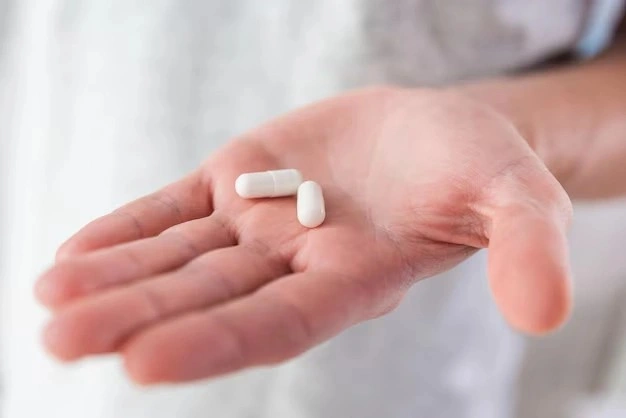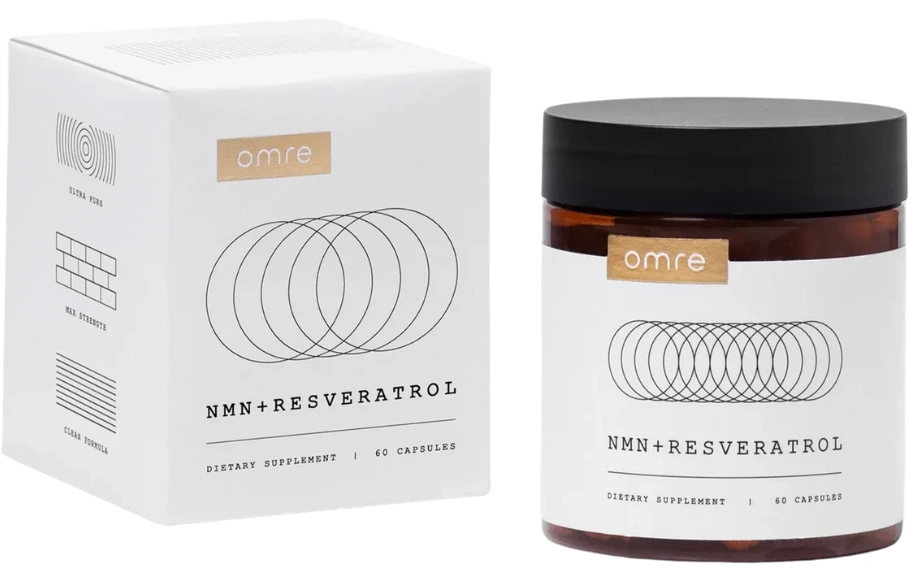Table of Contents
Most people take between 150 mg to 500 mg of resveratrol a day, depending on their health goals. Higher doses have been used in research, but they may come with side effects.
This article breaks down what resveratrol is, how much you might need, what benefits it offers, and what to watch out for if you're thinking of adding it to your routine.
Cellular NAD+ booster with ultra-pure NMN and Resveratrol, at research-backed doses.*NMN + RESVERATROL
How Much Resveratrol Should I Take?
 There’s no one-size-fits-all dosage, but most experts suggest 150 to 500 mg per day is a safe starting range. Some clinical trials have tested doses up to 5,000 mg, but anything over 2,500 mg often leads to side effects like nausea or stomach cramps.
There’s no one-size-fits-all dosage, but most experts suggest 150 to 500 mg per day is a safe starting range. Some clinical trials have tested doses up to 5,000 mg, but anything over 2,500 mg often leads to side effects like nausea or stomach cramps.
Studies have shown that even 150 mg of resveratrol daily can help lower systolic blood pressure, though it may not affect other markers like diastolic pressure (1).
The truth is, research is still catching up. What works well for one person might not be right for another. That’s why it’s best to talk to your doctor before jumping into higher doses, especially if you’re on medication or have underlying health conditions.
Human studies are mixed, and tolerance levels vary. Some people do just fine with lower doses, while others need more to feel any noticeable effect.
Until more research is available, starting low and working with a healthcare provider is the smartest path forward.
What Is Resveratrol?

Resveratrol is a plant compound found in grapes, red wine, peanuts, and some berries. It acts like an antioxidant, helping protect your body’s cells from damage caused by free radicals.
It belongs to a group of polyphenols called stilbenoids. Plants produce it as a natural defense when they’re stressed, from things like UV rays or infections. That stress-fighting role in plants is what sparked interest in how resveratrol might help humans too.
Because it can reduce oxidative stress and support cellular function, scientists have been studying it for decades. It's now a popular ingredient in supplements aimed at promoting heart health, healthy aging, and more.
Benefits of Resveratrol
 Resveratrol is linked to a wide range of possible health benefits. Most of the research is still early-stage, but results so far are promising, especially when it comes to inflammation, heart health, and metabolic support.
Resveratrol is linked to a wide range of possible health benefits. Most of the research is still early-stage, but results so far are promising, especially when it comes to inflammation, heart health, and metabolic support.
Here are some of the top potential benefits, according to research:
Fights free radical damage: Studies have found that resveratrol acts as an antioxidant, helping neutralize harmful free radicals that damage cells and speed up aging (2).
Supports heart health: Several studies suggest it may help lower blood pressure and improve blood flow, reducing the risk of cardiovascular problems (3).
Improves insulin sensitivity: Research has shown that resveratrol may activate sirtuins, which support better glucose metabolism and insulin response (4).
Protects brain function: Some studies have found neuroprotective effects, especially in areas related to memory and cognitive health (5).
Anti-inflammatory effects: Animal studies and early human data show that resveratrol may help reduce chronic inflammation in the body (6).
- May support reproductive health: Some findings suggest benefits for ovary function, male fertility, and even hormone regulation, though more research is needed (7, 8).
Are There Any Side Effects?
Resveratrol is generally safe at low to moderate doses, but higher amounts can lead to stomach issues like nausea or diarrhea. Side effects usually show up when people take more than 2,500 mg per day.
While most people tolerate resveratrol well at lower doses, some research has raised questions about how it behaves in the body.
One study suggested that in high concentrations, it could act as a pro-oxidant instead of an antioxidant (9). That means it might actually harm cells in certain situations, though this effect hasn’t been seen in typical daily use.
Here’s a list of possible side effects, especially at higher doses:
Nausea or upset stomach
Diarrhea
Cramps or bloating
Vomiting (in rare cases)
Liver dysfunction (seen in very high or prolonged use)
Bicytopenia — a rare drop in blood cell count seen in one long-term study involving 1.5g per day
High doses can also interact with medications. Resveratrol may affect blood clotting, so if you’re taking blood thinners or NSAIDs, check with your doctor first. Some evidence also suggests it might interfere with how certain drugs are metabolized.
It’s always better to play it safe. If you notice any unusual symptoms after starting resveratrol, scale back and talk to a healthcare provider.
Resveratrol Dosage by Goal
Different people take resveratrol for different reasons, so the right dose can depend on what you're hoping to support. Here are some common goals and the typical ranges seen in studies or suggested by experts:
General wellness: Many people take 150–300 mg per day as part of their daily supplement routine. This amount is often considered a low to moderate dose and is generally well tolerated.
Heart health and blood pressure support: Studies have used doses starting from 150 mg and up to 500 mg daily to observe changes in blood pressure and cholesterol levels. Results vary, but some research has shown a mild improvement in systolic blood pressure.
Anti-aging and longevity: Some longevity researchers and supplement users lean toward 250–1000 mg per day, aiming to activate sirtuins and support healthy aging. Human data is still developing, so this is best done under professional guidance.
Metabolic support or insulin sensitivity: Clinical studies have used 500–1500 mg daily, particularly in people dealing with blood sugar or metabolic concerns. Effects can depend on diet, lifestyle, and consistency.
Clinical trials or short-term research use: Doses as high as 2000–5000 mg per day have been tested in trials. These are usually monitored closely and are not meant for unsupervised daily use.
Factors That Affect the Ideal Dosage
What works for one person may not work for another. Your ideal dose of resveratrol depends on several factors: your health goals, current health conditions, and how your body generally responds to supplements.
If you're already following a healthy lifestyle, you may only need a smaller dose to maintain balance. But if you're managing certain health issues, your doctor might suggest a higher dose for a short period.
Keep in mind that your body's ability to absorb and process resveratrol also matters. Some supplements include ingredients like Bioperine® to help with absorption, which may influence how much you actually need.
Age, medications, and whether you're taking resveratrol with food can also make a difference. Since it's fat-soluble, taking it with a meal that contains some healthy fat can help your body absorb it better.
How to Take Resveratrol Safely
Taking resveratrol safely is all about being mindful with the dose and how you introduce it into your routine. Start low, especially if you’ve never taken it before. Many people begin with 100 to 150 mg daily and see how their body responds before going any higher.
Because resveratrol is fat-soluble, it’s best to take it with a meal that contains healthy fats, like nuts, olive oil, or avocado. This helps your body absorb more of the compound instead of wasting it.
If you're combining it with other supplements, check for overlap. Some anti-aging blends already include resveratrol, so you might be doubling up without realizing it. Also, watch for potential interactions with medications, especially blood thinners or NSAIDs.
It’s always a good idea to talk to your doctor or a healthcare provider, particularly if you’re planning to take more than a basic dose or use it for a specific health concern.
Is It Safe to Take High Doses of Resveratrol?
High doses of resveratrol, anything above 2,500 mg per day, have been used in clinical trials but may cause side effects like nausea, stomach upset, and even liver-related issues in some cases.
Research shows that resveratrol is well-tolerated in doses up to 1 gram (1,000 mg) per day for most people (10).
A 2016 study found that one participant developed a rare side effect called bicytopenia while taking 1.5 grams daily over six months, though this is not common (11). In general, side effects like diarrhea, bloating, or fatigue are more likely with doses above 2,500 mg.
Long-term safety data are still limited. Most studies that used high doses were short-term and closely monitored.
So while high doses might be okay in specific settings, they aren’t recommended for everyday use without professional supervision.
If you're curious about going above 500–1000 mg per day, it’s best to get medical input first.
Conclusion
Resveratrol has become a popular supplement for good reason. It’s a natural compound with potential benefits for heart health, inflammation, aging, and more.
Most people do well with a dose between 150 to 500 mg per day, though higher amounts have been studied in clinical settings. The right dose for you depends on your health goals, your body’s tolerance, and whether you're working with a healthcare provider.
Start low, take it with food, and be patient. Like most supplements, resveratrol works best when paired with healthy habits and taken consistently. If you're looking for a clean and effective supplement, OMRE NMN + Resveratrol offers a research-backed blend with added absorption support.
If you're looking for a clean and effective supplement, OMRE NMN + Resveratrol offers a research-backed blend with added absorption support.
You can check availability and see if it’s the right fit for your routine.
FAQs
Is 1000 mg of resveratrol too much?
It depends on the person. For many, 1000 mg per day is still within the safe range. But if you're new to resveratrol or taking other medications, it’s a good idea to talk to your doctor first.
Can I take resveratrol every day?
Yes, many people take resveratrol daily. Just stick to a consistent dose that works for your body and health needs.
Should I take resveratrol with or without food?
Take it with food, ideally something with healthy fat like nuts or olive oil. Resveratrol is fat-soluble, so this helps your body absorb it better.
How long does it take to see results?
That varies. Some people may notice subtle changes in a few weeks, while others may need a few months. Resveratrol tends to work quietly in the background, supporting your body over time.





